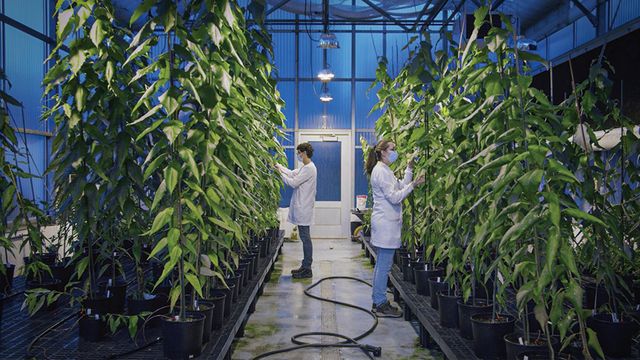How CRISPR is solving problems through DNA editing
With the ability to replace and modify genes, CRISPR technology has the potential to solve some of the world's biggest problems.
Posted — UpdatedEradication of certain diseases, increasing crop sizes, reducing pest populations — the current and future applications of CRISPR have the potential to change ways of life around the world.
A tool for editing genomes — including altering DNA and modifying gene functions — CRISPR is short for CRISPR-Cas9 and refers to a string of DNA and the Cas9 enzyme. CRISPR works by finding a specific section of DNA, cutting it, then inserting a mutation or replacing a faulty gene.
Rodolphe Barrangou, a professor at NC State and lead in a CRISPR lab, first learned about CRISPR over a decade ago.
"I was working about 15 years ago on deciphering and understanding how bacteria that ferment milk into yogurt and cheese function. I was looking at their genomes to understand what they do and how they work, and we discovered CRISPR sequences," said Barrangou. "We established their immune function as systems that enable them to withstand infectious disease and viral attacks and bacteria by cutting their DNA. Those products, those technologies, really enable the development of more sustainable and more robust to culture that are used globally for the food supply chain to make dairy products."
With a strong reputation in technology and science, the Research Triangle is a hub for CRISPR research and application.
"The RTP is one of the CRISPR hubs in the world, and we’ve had multiple CRISPR related startup companies. We are not just impacting science, technology and academia, but also making a real impact in the business world," said Barrangou.
One surprising CRISPR application in the state? Forestry.
"Forestry is so important to North Carolina, and CRISPR is going to be revolutionary for the forestry field. Not only does forestry contribute to over 150,000 local jobs, but it also contributes over $32 billion to the local economy. In fact, forestry is the top employer across all manufacturing sectors in North Carolina," said Jack Wang, director of the Forest Biotechnology Group, or FBG, at NC State.
At FBG, Wang and his team seek out research innovations in forest biotechnology and molecular genetics in order to improve the growth, development and resiliency of trees. In the future, they hope to see innovations that could aid in reforestation, defend trees against pests and lessen the effects of climate change — and many of these goals are being achieved with the help of CRISPR.
And NC State isn’t the only institution in the Triangle that’s getting on board with CRISPR research. In fact, the University of North Carolina at Chapel Hill recently launched a new CRISPR screening center, with the help of the North Carolina Biotechnology Center. The facility will allow researchers to screen for drug targets and aid in health discoveries.
As CRISPR research and application expands, so too does the potential for the technology to solve global issues.
"CRISPR has changed my life. It's great. It's exciting. It's rewarding. It's impactful. And I'm actually even more inspired by the next generation of scientists, the people in my lab who are just starting their scientific career, to solve bigger problems," said Barrangou. "Can we make our world better? The potential of science and technology is most promising than it's ever been, and that's going to change the world."
• Credits
Copyright 2024 by Capitol Broadcasting Company. All rights reserved. This material may not be published, broadcast, rewritten or redistributed.






